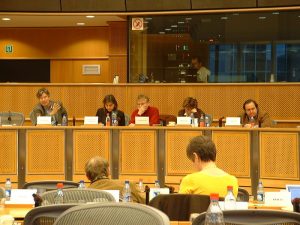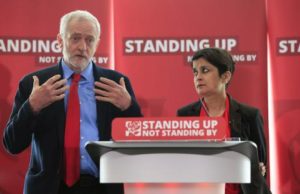JJP’s campaign to protect free speech on Israel

Jewish demonstration in Parliament Square
5 September 2018
JJP has been campaigning to protect free speech on Israel, working by itself and with others, in the UK and Europe, for nearly three years. The attacks on criticism of Israel have taken the form of conflating serious criticism of Israel with antisemitism. Yes, antisemitism exists, it concerns us, and it should be called out whenever it is found. There are some people who combine antisemitism with a justified anger at Israel, and their antisemitism should also be called out. However, the repeated attacks have exaggerated what evidence shows to be a relatively low level of genuine antisemitism on the left as if it were a major problem, taking remarks out of context and exaggerating the number of genuine antisemitic remarks.
The attacks have now crystallised in demanding that left-wing and liberal parties, and parliaments, adopt the IHRA definition of antisemitsm in full, without qualification. The IHRA document is written in such a convoluted way that it creates massive uncertainty as to what criticism of Israel would be legitimate and what would be antisemitic. That would undermine people’s confidence in criticising Israel at all. The effect on freedom of speech on Israel-Palestine would be chilling. In fact, the document was written, years before the IHRA took it up, as a tool for gathering data on potentially antisemitic incidents on a consistent basis. It is being misused by the established pro-Israel Jewish leadership as a means of deciding whether any particular comment is antisemitic.
In he UK, we started campaigning in June 2016 with our submission to the Labour Party Chakrabarti inquiry. We followed up by commenting on the Jewish Leadership Council/Board of Deputies demonstration in Parliament Square, writing to the Labour Party and writing to the press. We met the General Secretary of he Labour Party and made a formal submission as part of the party’s consultation on antisemitism. We have written to the Liberal Democrat Party which is also under pressure to adopt the IHRA definition.
Both the Labour Party National Executive Committee and the Liberal Democrat Party Federal Board now appear to succumbed to the pressure and adopted the IHRA document in full. However, the Labour Party National Executive also approved the release of brief remarks emphasising freedom of expression on Israel and the rights of Palestinians. The Liberal Democrats have not yet issued any clarification. It remains to be seen how events will develop at the party conferences, and later as debate about Israel and Palestine continues.
Our U.K. campaigning has required us to lobby the Labour and Liberal Democrat Parties about this issue, in addition to our normal lobbying about Israel-Palestine. Our campaigning against using the IHRA document supports the full spectrum of free speech on Israel, not just what JJP campaigns on. Accordingly, we support people’s right to advocate one state or to question the premises of Zionism even though we don’t campaign on either basis.

discussion in European Parliament committee room
In addition to our specific JJP campaigning, we have taken part in the consortium of campaigning groups that commissioned Leading Counsel’s Opinion on the deficiencies of the IHRA document. The Consortium disseminated the Opinion to universities and local authorities, and has been active in support of pro-Palestinian events when the IHRA document has been used to try to restrict or cancel them.
We have also been active, through European Jews for a Just Peace (EJJP), in protecting free speech on Israel in the European Union, also starting in mid-2016. This has taken the form of lobbying the European Parliament, the European Commission, the Coordinator for combating antisemitism, and the Fundamental Rights Agency. The European Parliament passed a resolution including support for the IHRA document. The Group of Progressive Alliance of Socialists and Democrats subsequently published a statement that it is legitimate to criticise the Israeli government.
____________________
Update 22 September 2018

The National Liberal Club
The Liberal Democrat Party has adopted the Home Affairs Select Committee’s two caveats to the IHRA definition, in addition to adopting the definition itself and all its examples. The two caveats are:
It is not anti-Semitic to criticise the Government of Israel, without additional evidence to suggest anti-Semitic intent.
It is not anti-Semitic to hold the Israeli Government to the same standards as other liberal democracies, or to take a particular interest in the Israeli Government’s policies or actions, without evidence to suggest anti-Semitic intent.
No political party should have adopted the IHRA document. It’s uncertain and confusing formulations will have a chilling effect on party members’ willingness to exercise their legal right to criticise Israel or Zionism. However, adopting the caveats has significantly limited the damage in the Liberal Democrat Party because they protect party members’ right to criticise the Israeli government. Unfortunately, they do not appear to protect party member’s right to question the nature of Zionism, the methods used by the Zionist leadership to create Israel, or the nature of Israeli society today.
____________________
Update, 26 September 2018

Jeremy Corbyn and Shami Chakrabarti
Jeremy Corbyn made two significant statements at the Labour Party Conference today. (https://jfjfp.com/corbyn-if-elected-labour-will-immediately-recognize-palestinian-state/)
Firstly, if elected Labour will immediately recognise the Palestinian state. That reinforces the commitment made in Labour’s Manifesto for the last election.
Secondly, he said Labour “is against anti-Semitism in all forms”. He acknowledged, without reservation, the history of persecution of Jews, and he said “The row over antisemitism has caused immense hurt and anxiety in the Jewish community and great dismay in the Labour Party. But I hope we can work together to draw a line under it.’”… In all this, he also, rightly, placed fighting antisemitism in the context fighting racism.
It remains to be seen how the Jewish Leadership Council, the Board of Deputies of British Jews and the Jewish Labour Movement react to his statements. If they are genuinely concerned about antisemitism in the Labour Party, they will welcome the second statement, even if they disagree with the first as they undoubtedly will. They should be able to separate the two issues.
But if they continue to cavil that Labour’s adoption of the IHRA document is not enough, or to demand that a comment which could be proscribed by the IHRA document must automatically lead to a sanction without the accused being given the benefit of due process, or that Jeremy Corbyn is irredeemably soft on antisemitism and must go, then it will be clear to all that their motives in attacking Labour so assiduously for three years are not what they seem. It will prove that they have mainly been concerned to stifle serious criticism of Israel and support for the Palestinians, not to fight antisemitism, just as JJP has argued.
Since the affair of the expunged mural in March, the Jewish leadership’s attacks on Labour have increasingly focused on Jeremy Corbyn himself, no doubt because of his unwavering support for the Palestinian cause. In our view, there is also a specific reason for that hostility. While he remains Party leader, the Labour Party’s commitment to recognise the State of Palestine must be taken seriously. If he becomes Prime Minister, he will be able to recognise Palestine as a state immediately, just has he pledged. Parliament has already voted for recognition in 2014, but in any case he would not need Parliamentary support because recognition of states is in the government’s gift.
The parliaments of UK, France, Iceland and Ireland all voted to support recognition of Palestine in 2014. Israel lobbied hard against those votes and continues to lobby against recognition in Europe, supported strongly by the national Jewish leaderships. Sweden has already recognised the State of Palestine. Should the UK follow, other European countries might well also follow. That would reduce the imbalance of power between Israel and the Palestinians in any future negotiations, and it would encourage countries to consider taking further steps in support of the Palestinians if Israel continues to act is if it is above the law.
___________________
List of submissions, comments and lobbying letters
submission to the Labour Party (here)
JJP letter to the President of the Liberal Democrat Party (here)
letter in the Financial Times (here)
statement in support of Executive member Glyn Secker (here)
Comment on Board of Deputies/Jewish Leadership Council demonstration (here)
Letter to President of the European Commission (here)
letter to President of the European Parliament (here)
letter to Members of European Parliament (here)
letter to European Parliament Justice Committee (here)
Leading Counsel’s Opinion on the IHRA document (here)
submission to Labour Party Chakrabarti inquiry (here)
letter to European Commission official for combating antisemitism (here)
